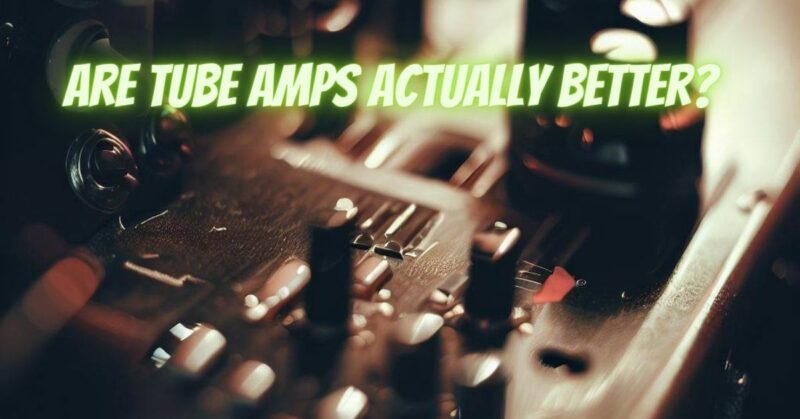The debate between tube amps and solid-state amps has been a long-standing topic of discussion among audiophiles and musicians. Tube amps have a rich history and a reputation for delivering warm, harmonic tones, while solid-state amps are known for their reliability and efficiency. In this article, we will debunk some common myths surrounding tube amps and explore the advantages they offer to determine whether they are, in fact, better than solid-state amps.
The Tube Amp Myth:
Myth 1: Tube Amps Always Sound Better: One common myth is that tube amps always produce better sound quality than solid-state amps. While tube amps do offer a warm and organic sound with natural compression and harmonic distortion, it’s essential to recognize that “better” is subjective and depends on individual preferences and musical styles.
Myth 2: Tube Amps Are Always Louder: Another misconception is that tube amps are inherently louder than solid-state amps. In reality, the wattage and efficiency of the amp determine its loudness, regardless of whether it is a tube or solid-state design.
Advantages of Tube Amps:
- Warm and Organic Sound: Tube amps are known for their pleasant and musical tone, characterized by smooth compression and harmonic distortion. Many musicians and audiophiles prefer this sound for certain genres, such as blues, jazz, and classic rock.
- Dynamic Response: Tube amps have a unique dynamic response, reacting to the player’s touch and playing style. They provide a more interactive and expressive playing experience, allowing musicians to achieve various tones by adjusting their playing dynamics.
- Natural Overdrive: Tube amps can produce pleasing overdrive and saturation when pushed to higher volumes, creating a natural and musical distortion that many guitarists adore.
- Vintage Appeal: Tube amps often have a vintage aesthetic and tactile charm, appealing to those who appreciate classic audio equipment.
Advantages of Solid-State Amps:
- Reliability and Durability: Solid-state amps are generally more reliable and less prone to component failures compared to tube amps. They require less maintenance and are often preferred for touring and gigging due to their ruggedness.
- Efficiency and Lightweight: Solid-state amps are more energy-efficient and lighter in weight, making them easier to transport and more suitable for portable setups.
- Consistent Tone: Solid-state amps provide a consistent tone regardless of the volume level, which can be advantageous for recording and situations where tonal consistency is essential.
- Affordable: Solid-state amps are typically more affordable than tube amps, making them accessible to a broader range of musicians.
The debate over whether tube amps are better than solid-state amps ultimately comes down to personal preference, musical style, and the desired tonal characteristics. Tube amps offer a warm and organic sound with dynamic response and natural overdrive, appealing to those who value vintage tone and expressive playing. On the other hand, solid-state amps provide reliability, durability, consistent tone, and affordability, making them a practical choice for many musicians, especially for modern genres and live performances.
In conclusion, both tube amps and solid-state amps have their strengths and advantages, and the decision between them should be based on individual preferences and requirements. Musicians should consider their playing style, the genres they play, portability needs, budget constraints, and tonal preferences when choosing between tube amps and solid-state amps. Ultimately, the “better” amp is the one that best suits the specific needs and artistic vision of each musician.


